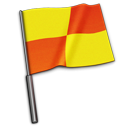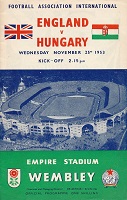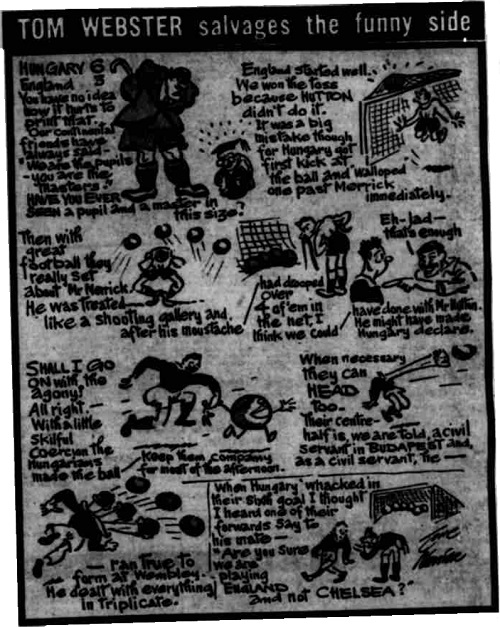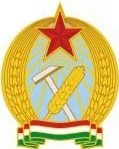|
|
flg.jpg)  "ENGLAND
MEET THEIR MASTERS—CRASH 6-3"
Daily Mirror "ENGLAND
MEET THEIR MASTERS—CRASH 6-3"
Daily Mirror |
  Officials
from Netherlands Officials
from Netherlands |
England |
FIFA ruling on substitutes |
Hungary
Party |
Referee ("clad in a grey suit")
Leopold Sylvain Horn
37 (29 August 1916), Sittard |
The FIFA ruling of allowing a substitute to replace an injured player prior to the 44th minute, and a goalkeeper at any time, is in place.
Teams presented to the Earl of Athlone, the FA President. |
|
flame flag
Linesmen
orange flag |
Klaas
Schipper
42 (2 December 1910), Groningen |
Johann Bronkhurst
39
(3 March 1914), Velp |
|
|
|
flg.jpg) England
Team England
Team |
| |
|
Rank |
No official ranking system established;
ELO rating 3rd to 4th |
Colours |
The 1949 home
uniform -
White collared jerseys, blue shorts, black socks with white
tops.
|
|
P 36th of 43, W 20 - D 9 - L 7 - F 97 - A 56. |
|
Captain |
Billy Wright
|
Manager |
Walter Winterbottom, 40 (31 March 1913), appointed as FA national director of coaching/team manager on 8 July 1946; |
|
record 40th of 90, W 24 - D 8 - L 8 - F 104 - A 58. |
Trainer: Jimmy Trotter (Charlton Athletic FC) |
P 58th of 139, W 37 - D 12 - L 9 - F 174 - A 77,
inc. one abandoned |
|
|
 ³ ³ |
Team chosen by Selection Committee headed by Harold
Shentall on Thursday, 19 November. |
flg.jpg) England
Lineup England
Lineup |
|
|
five
changes
to the previous match
(Rickaby, Quixall, Hassall, Lofthouse & Mullen out) |
league position
(19 November) |
|
|
|
Merrick, Gilbert H. |
31
303 days |
26 January 1922 |
G |
Birmingham City FC
(FL2 5th) |
17 |
27ᵍᵃ |
|
first to 27ᵍᵃ |
|
2 |
Ramsey, Alfred E. |
33
307 days |
22 January 1920 |
RB |
Tottenham Hotspur FC
(FL 14th) |
32 |
3
 ³ ³ |
 |
16th
successful penalty kick (27th overall) |
oldest to take & score a penalty |
final app
1948-53 |
|
|
|
|
16 July 1925 |
|
3 |
Eckersley, William |
28
132 days |
LB |
Blackburn Rovers FC
(FL2 8th) |
17 |
0 |
|
final app
1950-53 |
|
4 |
Wright, William A. |
29
292 days |
6 February 1924 |
RHB |
Wolverhampton
Wanderers FC
(FL 2nd) |
55 |
3 |
|
most apps 1952-53 |
|
5 |
Johnston, Harry |
34
60 days |
26 September 1919 |
CHB |
Blackpool FC
(FL 6th) |
10 |
0 |
|
final app
1946-53 |
|
6 |
Dickinson, James
W. |
28
215 days |
24 April 1925 |
LHB |
Portsmouth
FC
(FL 21st) |
32 |
0 |
|
7 |
Matthews, Stanley |
38
297 days |
1 February 1915 |
OR |
Blackpool FC
(FL 6th) |
36 |
9 |
|
725 |
8 |
Taylor, Ernest |
28
84 days |
2 September 1925 |
IR |
Blackpool FC
(FL 6th) |
1 |
0 |
|
the eighth Blackpool player to represent
England |
only app
1953 |
9
  |
Mortensen, Stanley H. |
32
183 days |
26 May 1921 |
CF |
Blackpool FC
(FL 6th) |
25 |
23 |
|
final app
1947-53 |
10
 |
Sewell, John |
26
305 days |
24 January 1927 |
IL |
Sheffield Wednesday FC
(FL 11th) |
5 |
3 |
|
726 |
11
 |
Robb, George |
27
177 days |
1 June 1926 |
OL |
Tottenham Hotspur FC
(FL 14th) |
1 |
0 |
|
the 22nd Hotspur player to represent
England |
only app
1953 |
|
unused
substitutes: |
Bert Williams (Wolverhampton Wanderers FC
(FL 2nd)),
Joe Kennedy (West
Bromwich Albion FC
(FL TOP)) and
Harold Hassall (Bolton Wanderers FC
(FL 5th)). |
|
team changes: |
Tom Finney (Preston North End FC
(FL 12th)) was the original named
outside-left, a groin injury forced his withdrawal on 22 November. He
was replaced by Robb the day after. |
|
team notes: |
Ernie Taylor and George Robb become
the 74th & 75th players to be fielded by Winterbottom, they also
become the 89th and 90th to be named onto the teamsheets. |
|
penalty notes: |
Alf Ramsey becomes the first player to score from the penalty spot
three times. Already the oldest and most experienced penalty-kick
scorer. |
|
records: |
This defeat ended a record sequence of six matches unbeaten at Wembley
by England. |
|
goalscoring
records: |
Nat Lofthouse ends the year as top goalscorer for the third
successive year. His six goals coming across eight matches. |
|
The England team were set up in their Hendon headquarters prior to
this match, training on Chelsea FC's Stamford Bridge ground.... at the
same time as the dog-racing trials, and at the Bank of England ground
at Roehampton the day before the match. |
|
|
|
2-3-5 |
Merrick -
Ramsey, Eckersley -
Wright, Johnston,
Dickinson -
Matthews, Taylor, Mortensen, Sewell, Robb. |
|
Averages: |
Age |
28 years 130
days |
Appearances/Goals |
21.0 |
3.5 |
|
=most experienced post-war team so far |
|
|
|
 Hungary
Team Hungary
Team |
| |
|
Rank |
No official ranking system established;
ELO rating 2nd to 1st |
Colours |
"Cherry Red"
buttoned-up collared jerseys, white shorts, white socks with
green/red tops |
|
Captain |
Ferenc Puskás |
Selection |
Selection Committee headed by Gusztáv Sebes
Team chosen in London on Monday, 23 November 1953. |
|
Trainer:
Gyula Mándi |
 Hungary
Lineup Hungary
Lineup |
|
1 |
Grosics, Gyula, injured off 83rd
min. |
27
294 days |
4 February 1926 |
G |
Budapest Honvéd SE |
28 |
21ᵍᵃ |
|
no number in the second half |
|
2 |
Buzánszky, Jenő |
28
205 days |
4 May 1925 |
RB |
Dorogi FC |
20 |
0 |
|
4 |
Lóránt, Gyula |
30
292 days |
6 February 1923 |
RCB |
Budapest Honvéd SE |
22 |
0 |
|
6 |
Zakariás, József |
29
245 days |
25 March 1924 |
LCB |
Vörös Lobogó SE |
28 |
0 |
|
3 |
Lantos, Mihály |
25
57 days |
29 September 1928 |
LB |
Vörös Lobogó SE |
27 |
1 |
5
   |
Bozsik MP, József |
27
362 days |
28 November 1925 |
DM |
Budapest Honvéd SE |
45 |
4 |
9
   |
Hidegkuti, Nándor |
31
277 days |
3 March 1922 |
AM |
Vörös Lobogó SE |
33 |
24 |
|
7 |
Budai, László |
25
129 days |
19 July 1928 |
OR |
Budapest Honvéd SE |
19 |
7 |
|
8 |
Kocsis, Sándor P. |
24
65 days |
21 September 1929 |
IR/F |
Budapest Honvéd SE |
33 |
35 |
10
 
  |
Puskás,
Ferenc |
26
238 days |
1 April 1927 |
IL/F |
Budapest Honvéd SE |
52 |
61 |
|
most apps & goals |
|
11 |
Czibor, Zoltán |
24
94 days |
23 August 1929 |
OL |
Budapest Honvéd SE |
26 |
6 |
 Hungary Substitute Hungary Substitute |
|
scoreline:
England 3
Hungary 6 |
|
|
Gellér, Sándor, on 83rd min. for Grosics |
28
136 days |
12 July 1925
in Veseuş, Romania |
G |
Vörös Lobogó SE |
4 |
1ᵍᵃ |
|
result:
England 3
Hungary 6 |
|
unused substitutes: |
Imre Kovács (Vörös Lobogó SE), Lajos Csordás
(Budapesti Vasas SE), Péter Palotás and
Károly Sándor (both Vörös Lobogó SE), Mihály Tóth and Pál Várhidi (Budapesti Dózsa SE). |
|
team notes: |
Grosics was
eventually replaced after 83 minutes because of an arm injury he
sustained in attempting to save Ramsey's penalty. |
|
the substitution: |
"seven minutes from time Grosics appealed to the referee to be
allowed to retire with an arm injury, and his deputy Geller, jumping
so high for joy, he hit his head on the crossbar, was allowed to take
over." |
|
|
|
4-(1-1)2-4 |
Grosics (Gellér)
-
Buzánszky, Lóránt, Zakariás,
Lantos -
Bozsik -
Hidegkuti -
Budai,
Kocsis, Puskás, Czibor. |
Averages:
(start)
(finish) |
Age |
27 years 173
days
27 years 192
days |
Appearances/Goals |
30.3 |
12.0 |
|
most experienced opposing side
so far |
|
|
|
|
Match Report by
Mike Payne |
|
 There
can be no words to adequately describe the feelings of the 100,000 people
present at Wembley Stadium on this dull and grey November afternoon. The
game, which was talked about for as long as football is played, produced
one of the most exciting and breathtaking team performances the world has
ever seen. There
can be no words to adequately describe the feelings of the 100,000 people
present at Wembley Stadium on this dull and grey November afternoon. The
game, which was talked about for as long as football is played, produced
one of the most exciting and breathtaking team performances the world has
ever seen.
The disappointment that was felt by England, at last losing their long and
distinguished unbeaten home record against foreign opposition, was
certainly tempered by the knowledge that the record was finally taken by
such a superb team. The current Olympic champions were simply magnificent!
Hungary tore through
the home defence almost at will and the goal tally in no way flattered
them. Indeed, England had a rude awakening to the true realities of world
football. Many regular supporters had realised before the game that the
writing had been on the wall for some time. Recent performances had not
been good but the sheer devastation of this result will take some getting
over.
Hungary scored after only 60 seconds. A forceful burst by
Bozsik, Zakariás and Hidegkuti ended with the centre-forward selling the
England defence a perfect dummy before crashing home a fierce shot.
England were stunned and never really fully recovered. To be fair they
did have their moments and they equalised after 15 minutes play. Just
before that goal, though, Hungary produced a brilliant move between Czibor
and the marvellous Puskás which was finished off by Hidegkuti.
Thankfully, from England's point of view, it was disallowed by the Dutch
referee for offside, but if it had counted it would have been one of the
greatest goals ever. As it was, England came away and somehow snatched an
equaliser.
This too came following a splendid move. Harry Johnstone
picked the ball up in his own half and fed a good pass forward for Stan
Mortensen to run on to. He, in turn, found Jackie Sewell and the
inside-left scored with a lovely left-foot shot wide of the driving
Grosics. Any thoughts England had of victory were soon nipped in the bud
as within 13 devastating minutes Hungary had forged a 4-1 lead.
They ripped open the heart of the England defence with some scintillating
football. On 20 minutes superb play by Puskás, Czibor and Kocsis
gave Hidegkuti the chance to score from close range, Straight after that,
Kocsis sent Czibor away down the right. Bill Eckersley had no answer to
his skills and the winger passed inside to Puskás. The podgy
inside-forward then produced a piece of sheer magic, a drag back that
totally fooled Billy Wright, and enabled him to drill home a ferocious
left-foot shot into the roof of the net between Gil Merrick and the near
post.
Minutes later, Bozsik took a free-kick and the ball flew past
Merrick off of Puskás heel. England were in total disarray, having
no answer to the cherry red shirted marvels. To their credit and mainly
due to the skills of Stanley Matthews and Mortensen they managed a slight
rally which brought them a second goal. George Robb forced Grosics into a
spectacular save and then Mortensen sped through after receiving a
throw-in to score with a glorious shot. The crowd rose to that goal and it
was reminiscent of earlier glory days of English football.
Alas, it
was the only glimpse the crowd would get this day of England at their
beast as after the break the Hungarians put the finishing touch to their
famous victory. Only ten minutes of the second half had gone when the
score was 6-2. First Boszik hit a tremendous rising shot for number five
and then Hidegkuti completed his personal treble when he volleyed home
after a lob by Puskás.
Although England had the last say in
the goalscoring they never looked like producing the miracle they needed
to come back from such a scoreline. The final goal came from the penalty
spot after Mortensen was brought down on the hour. Alf Ramsey was the
scorer.
England's proud record was shattered. They were beaten in
every aspect of the game and history must now be rewritten. Hungary had
everything and their game was made up of long and short passing with
absolutely lethal finishing. The capacity crowd would never forget them.
|
|
Match Report by
Norman Giller |
|
This was England's first defeat by foreign
opponents on home territory, and the match that changed the face of
English football. The Hungarians, Olympic champions and on a run of
twenty-nine successive matches without defeat, played to a flexible 4-2-4
formation and made England's 2-3-5 pattern seem about as outdated as a
hansom cab on a motorway. Nandor Hidegkuti, a deep-lying centre-forward,
nipped in for a hat-trick as two-goal Ferenc Puskás pulled the defence
inside out. England were flattered by the 6-3 scoreline. Alf Ramsey, Bill
Eckersley, Harry Johnston, Ernie Taylor, Stan Mortensen and George Robb
never played for England again. Taylor and Robb were making their debuts.
Hungary had given just a taste of what was to come in the first minute
when Hidegkuti collected a through ball from Puskás, deceived centre-half
Johnston with a distracting dummy and then fired the ball high into the net
from twenty yards. Gil Merrick was left flapping at mid-air. Moments after
Sewell had equalised in the fifteenth minute England were flattened by a
thirteen minute burst of Magyar magic. Two goals from the purist Puskás and
another from the elusive Hidegkuti made it England 1, Hungary 4. The 100,000
Wembley spectators could not believe their eyes. Stan Mortensen pulled it back
to 4-2 by half-time. But any hope England had of getting back into the game
died within ten minutes of the second half. First the cultured Jozef Bozsik
scored with a rising drive, and then Hidegkuti completed his hurricane
hat-trick when he put the finishing touch to a dazzling succession of passes
that ripped the England defence apart. Alf Ramsey scored a late penalty after
his Tottenham team-mate George Robb, a schoolmaster, was pulled down by
goalkeeper Grosics. The final scoreline could easily have read 10-3 to the
Hungarians. Billy Wright had never been given such a chasing in all his life
as the one he got from Ferenc Puskás.
|
|
Match Report by
Glen Isherwood |
|
Hungary were the Olympic Champions. They had
beaten England 2-1 in 1934 in Budapest but had suffered heavy defeats in
all their other meetings. England still held their proud unbeaten home
record against foreign opposition (discounting the mainly British-based
players of the Republic of Ireland in 1949 at Goodison Park) but the
Hungarians had built a formidable side and they showed it in the opening
minute when Nandor Hidegkuti's dummy took Johnston out of the way and
enabled him to shoot past Merrick into the top corner.
Hungary kept on the pressure but England broke away to equalise when
Johnston intercepted a Hungarian attack and ran upfield, eventually
releasing a perfect pass to Mortensen, who provided Jackie Sewell with a
chance to drive a low shot past Grosics. This was merely a stay of
execution.
Within
the next quarter of an hour, England were ripped to shreds by an
overwhelming display of world-class skill and finishing. A Czibor cross
was flicked on by Kocsis for Hidegkuti to score again. Ferenc Puskás made
Wright look amateurish when he pulled the ball back as the defender
committed himself and then smashed it into the roof of the net in the same
movement. Five minutes later, a Bozsik free-kick was diverted past Merrick
by the heel of Puskás.
England, typically, refused to lie down.
Stan Mortensen forced his way through to score England's second before the
interval but Hungary were just too good for them. A Czibor header was
pushed onto the post by Merrick but Jozsef Bozsik drove home the rebound
and then Puskás lobbed the ball up from Hidegkuti to complete his
hat-trick with a volley.
Fifty six minutes had gone. England were
6-2 down and beginning to face up to the fact that Hungary were in a
different class to them.
Alf Ramsey scored a penalty for England
four minutes later after Robb had been brought down by Grosics, who went
off injured ten minutes from time but the scoreline flattered England and
the manner of their defeat made them realise that they would have to
change their attitude and approach to succeed in world football.
The Hungarians emphasised their superiority by thrashing England 7-1 in
Budapest six months later.
They went to the World Cup in Switzerland as
odds-on favourites, but after being unbeaten for four years lost the final
to West Germany despite being two goals up after eight minutes.
|
|
Match Report
as appears in the F.A. Yearbook 1954-55, page 24 |
|
This
time the scoreboard unfortunately reflected only too fairly the rival
strengths of the teams. It is but sparse compensation to be able to
reflect that England lost her unbeaten home record to a team that played
with brilliance, flair, and zest; and it is but painful irony to note that
the Hungarians largely owned their victory to their mastering of the
'English Style'—interchanging forwards, a mingling of short and long
passes, the same defensive tactics, but all performed with almost
geometrical accuracy and ball control amounting to elegance. Apart from
all this they overcame the traditional Continental weakness at finishing
and shot four of their six goals from outside the penalty area.
Within
60 seconds the Hungarians took the lead when Hidegkuti successfully sold
the dummy to Johnston before sending in a devastating shot. England then
drew level after Mortensen made a well timed pass for Sewell to find the
net. Three more Hungarian goals followed in quick succession: the first
from Hidegkuti following a poor clearance by the English defence, the
second from Puskas after juggling skilfully with a diagonal pass, the
third also from Puskas who diverted a free-kick by Bozsik. Then shortly
before half-time Mortensen dashed forward from a throw-in to score
England's second goal.
Ten minutes after the interval Bozsik scored
again and he was quickly succeeded by Hidegkuti who completed Hungary's
triumph with a hat-trick. Though Ramsey converted a penalty to make the
final score 6-3, the issue by then was no longer really at stake and a new
page in the history of football had already been turned.
|
|
In Other News.... |
|
It was on 25 November 1953 that Brian Little was born in
Peterlee, County Durham. He spent his entire playing career
with Aston Villa. It ended with a knee injury when he was only
26, but he had scored the goals that won them the Football
League Cup in 1977, and he also won the competition as their
manager in 1996. Little won one England cap, in 1975, coming
on as a substitute for the last 17 minutes of a British
Championship fixture against Wales at Wembley, and provided
the cross for David Johnson's equaliser with five minutes
left. |
|
France beat the Republic of Ireland, 1-0 in Paris to qualify
for their first World Cup finals since the war. |
|
|
|
|
|
|
Domestic
Football Results
(25 November 1953) |
Football Association
Challenge
Cup First Round Replays:
Bournemouth & Boscombe Athletic
3 Southampton 1
Dean Court, Bournemouth
(13,580)
Fidler, Stephens, Cheney
~ Purves |
|
|
Bradford City 0 Crewe Alexandra
1
Valley
Parade, Bradford
(6,733)
Chapman |
|
|
Mansfield Town 0 Hartlepools
United 3
Field Mill, Mansfield
(6,237)
Wildon, Richardson, Linacre |
|
|
|
|
|
The eyes of the south coast were diverted from Wembley by
the Hampshire derby in which Bournemouth came from behind and got
the better of the more-famous Saints in only their second meeting,
the first being the drawn game at Southampton, four days earlier. |
|
|
|
|
|
|
|
Source Notes |
TheFA.com
Magyarfutball.hu
Original newspaper reports
Official matchday programme
The Complete Book of the British Charts |
|
Rothman's Yearbooks
Mike Payne's England: The Complete Post-War Record
Norman Giller, Football Author
Glen Isherwood's Wembley: The Complete Record
British Pathé |
|
|
cg |

.jpg)
1947.JPG)

